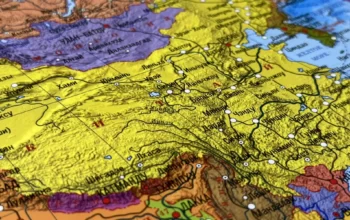Iran, which has the world’s second-largest gas reserves, has applied to join the BRICS group of Brazil, Russia, India, China and South Africa, which Beijing and Moscow see as a powerful global alternative to the West, Reuters recently reported.
The term BRIC was coined by Jim O’Neill, an expert at US financial conglomerate Goldman Sachs, in 2001 to describe the remarkable economic rise of Brazil, Russia, India and China. The BRIC countries held their first summit in June 2009 in Russia. South Africa joined the group in 2011.
“Iran’s membership in the BRICS group will bring additional benefits to all parties,” the Islamic Republic’s Foreign Ministry expressed confidence the day before.
Russia said Argentina had also applied to join the alliance.
“While the White House was thinking what else in the world should be turned off, banned or spoiled, Argentina and Iran have applied to join BRICS,” the British news agency quoted Russian Foreign Ministry spokeswoman Maria Zakharova as saying.
It was not possible to get an immediate comment from Argentine officials, but President Alberto Fernandez, who was currently in Europe, had in recent days reiterated his desire for Buenos Aires to join the BRICS, Reuters noted.
In his article for PERFIL, Alejandro Karlen, an Argentine MP in Parliament and chairman of the Economic, Financial, Commercial, Fiscal and Monetary Affairs Committee of Parliament, writes about the benefits of Argentina joining BRICS.
The BRICS group is a key platform for taking a rational stance, distancing itself from the influence of the G7 group and aiming at diversification. Such an international platform would mean the construction of a counter-hegemonic block, a process of rebalancing power relations as the basic platform and vector of multipolarity, and such a dynamic would imply the strengthening of multiple poles of power distributed in a harmonious way in the system of international relations.
Argentina’s potential accession to BRICS+ , recently proposed at its last summit, a proposal which gained the consensus of all its members, offers various and valuable possibilities.
In the case of Brazil , continue to deepen the strategic partnership of both countries to address the various “initiated” solutions to bilateral relations , deepen the strategic partnership of both countries to address the various issues of bilateral relations , agricultural and food cooperation , financial cooperation ; with South Africa cooperation in agriculture , mining , renewable energy , cooperation with India in science and technology issues (space , medical , defense , chemical , pharmaceutical With China – through Argentina’s recent accession to the New Silk Highway platform – the execution of infrastructure projects for development; with Russia, cooperation in the improvement of Argentine energy capacities, particularly in gas and hydrocarbons. In addition to the aforementioned cooperation axes, the possibility of Argentina’s accession is of great strategic interest from a financial perspective.
China has the largest economy in the BRICS, accounting for over 70% of the group’s total economic power of $27.5 trillion. According to the IMF, India accounts for about 13% and Russia and Brazil for about 7%. BRICS covers more than 40% of the world’s population and about 26% of the global economy.
Ever since the 1979 Islamic Revolution ousted the United States-backed Shah Mohammad Reza Pahlavi from power, Iran has been ostracised by the West and its economy has suffered severely from a host of sanctions. In addition to its vast gas resources, the Shiite power has about a quarter of the Middle East’s oil reserves.
410 total views, 2 views today



